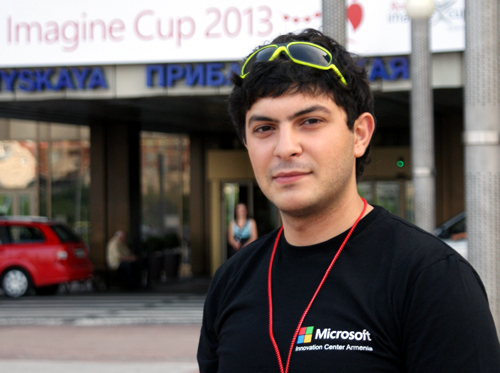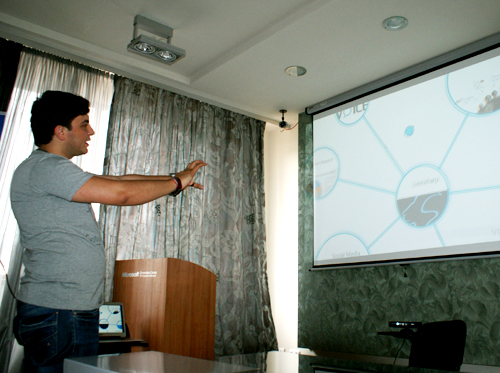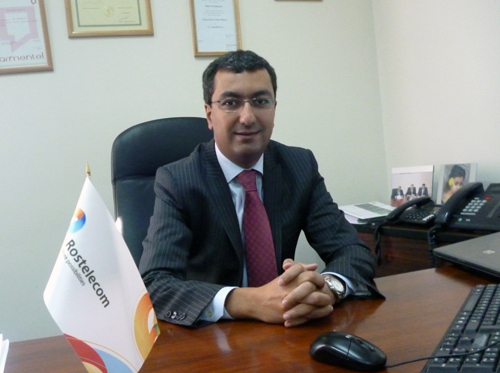-

Gevorg Hovsepyan
10:41 | 09.07.13 | Articles | exclusive 9092
Lionsharp: How to transform a dream to reality
The world final of Imagine Cup initiated by Microsoft starts in Saint Petersburg today. In this contest Armenia is represented by Lionsharp Solutions team with its Voiceboard, idea transmission tool, we have already told about.
A day before the Imagine Cup, co-founder of Lionsharp and technical solutions engineer, YSU graduate Gevorg Hovsepyan told Itel.am about how to realize the most daring ideas while living in Armenia.
- With the success made by Voiceboard, you have become a precedent for Armenian young people: it's possible to come up with an interesting idea in Armenia, attract necessary funding to realize it and enter the international market. Many of our young people are "broken" by the lack of this belief. Do you think the pessimism is grounded or no?
- Yes, in some way. Our students are limited in space, they don't quite imagine what innovations are going on in the international arena and what direction the technology is developing. Our universities don't provide them information on what technology is currently used across the globe, what business opportunities this or that sphere has.
This gap of information should be filled by universities. Foreign universities often pay attention to not only the content of your work but the ways of its practical application.
We also have lack of communication. Our students should socialize with fellow students studying in foreign universities to understand what they do and what innovations they are working on. In many cases, students in Armenia work on a project which has been used abroad for already several years.
Business accelerators in Armenia, venture funds, which should help people realize their ideas are also poor. To reach a result in our sphere, we should have a starting budget as we conduct experimental and research works.
As a student, I often faced this problem - we had good ideas but we didn't know whom to turn to get funding and begin realizing the idea.
We appreciate Microsoft Innovation Center's efforts in Armenia which tries to fill this gap. Universities should actively cooperate with such structures as Microsoft Innovation Center.
mLab regional mobile solutions laboratory also gives a good chance but such structures should be as many as possible as Armenia's current potential is really tremendous.
- How did you manage to overcome the gap?
- In January 2013, during the meeting with representative of Eleven Bulgarian venture fund at Microsoft Innovation Center, we showed an idea based on PowerPoint presentation. Presenting the idea, we said that it can be put into practice within a month. Next month, we presented Eleven a project managing words. We told them we can manage videos and photos in 2 months if we get the funding. They believed and made the investment. Now we are developing a project which manages words, sentences, pictures and videos. One should understand from the very beginning where he goes so as the investor could trust you.
We also benefited from the fact that we have an Italian and Englishman in our team. Owing to Nigel and Alessandro, our team becomes more global. Recently, Nigel presented our product to advertising companies and investors in England.
- What would you advise the young people who have interesting ideas but don't know how to realize them?
- I would first advise them to understand whether the idea will be in demand on the global or at least on the local market. You can just ask your friends and acquaintances whether they are ready to pay for such a product.
Funding is the next step. You should present the idea as clear as possible, state the sum and explain the areas the investments will be spent in.
It would be more desirable to quickly figure out what will be the outcome of your initiative - whether it's a technology to be paid to some major company, a new startup or something else.
- Lack of information among students make them desperate, they think whatever they do is already done in other places. Is there any serious difference between the professional skills of our and European programmers and engineers?
- We are currently working with the best 13 teams out of 400 picked up by Eleven and if we compare ourselves with European programmers and engineers I have to say we're not behind them, even we're ahead owing to our hard work. I dealt with local and European young professionals and I can claim without hesitation we are competitive.
- IT is declared a priority one in Armenia, but the steps toward developing the sphere have been made by private enterprises and funds so far. Have you been paid attention to by the state so far?
- It seems that Ministry of Education and Science doesn't even hear about us, which is very surprising and sad. Young professionals need the support of the state more than anyone else.
When I worked in TUMO, I met Armenian specialists from Google, Microsoft who studied in Armenia and then moved to foreign universities and now work in world-famous companies. These professionals either realize themselves in the foreign markets or stay here and degrade. It's conditioned by the fact that we're not keeping up with the world now.
Bulgaria is one of the developing countries of Europe but their government realizes tremendous work to boost IT sphere. It's no mere chance that they have around 2 dozens of venture funds there as of now.
- What short- and long-term plans do you have concerning Voiceboard and your further steps?
- We should have the final version of Voiceboard till the end of the year. In November, we are going to present it at TechCrunch in Germany where startups all over the world present their releases.
As for the future, we have high hopes that we will be able to work with Armenian young people and help them realize their ideas on the international level. In fact, we have opened the gate between Armenia and Europe in this field, we have the entry to their startup "ambience" and want all the interested persons in Armenia to be able to be recognized internationally.
Gevorg Hovsepyan was interviewed by Ruben Harutyunyan.

17:29 | 24.09.25 | Articles
Jacopo Losso on Cross-Border Investments and Why Armenia Attracts Angels








